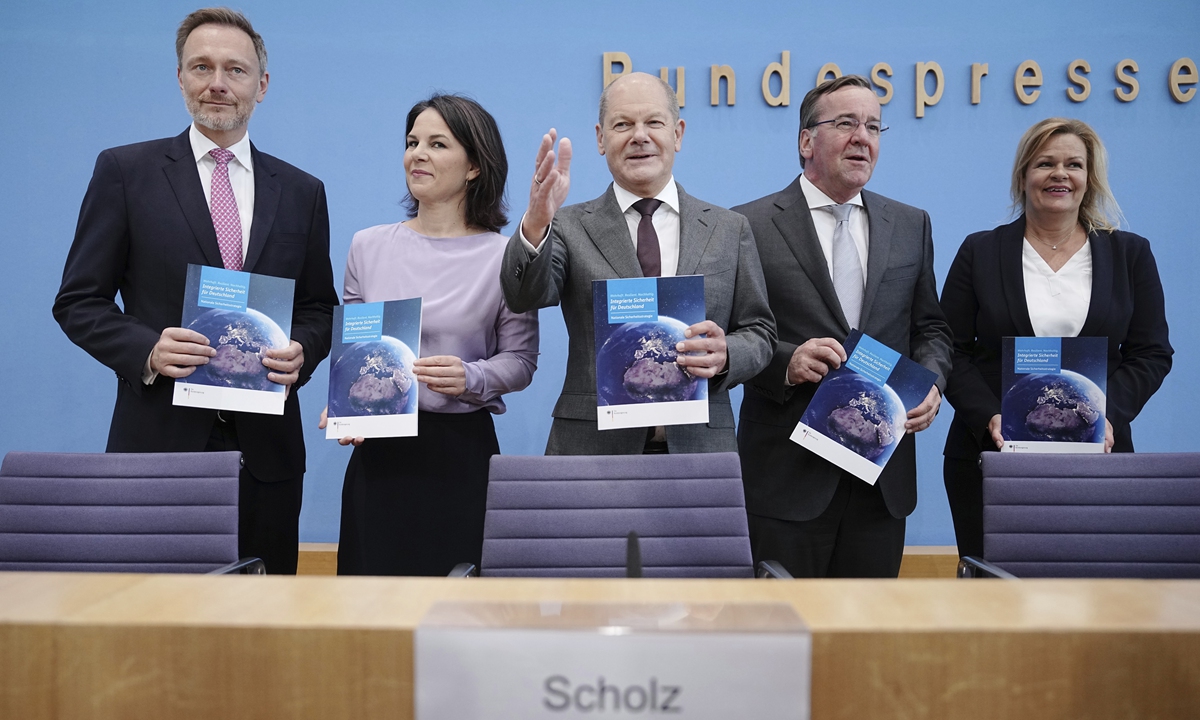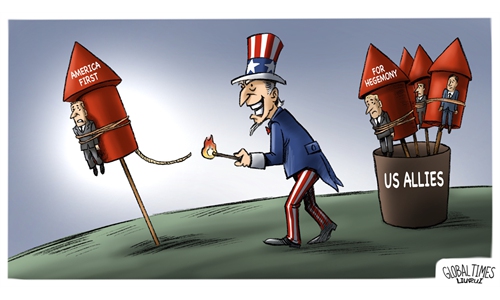
Christian Lindner (l-r, FDP), Federal Minister of Finance, Annalena Baerbock (B'ndnis 90/Die Gr'nen), Foreign Minister, Chancellor Olaf Scholz (SPD), Boris Pistorius (SPD), Minister of Defense, and Nancy Faeser (SPD), Federal Minister of the Interior and Home Affairs, attend a press conference in Berlin on the National Security Strategy, 14 June 2023. Photo: VCG
German Chancellor Olaf Scholz and Foreign Minister Annalena Baerbock on Wednesday unveiled the country's first-ever comprehensive national security strategy seeking to provide an overview of the country's foreign policy and ensure a cohesive cross-ministry approach to security, as well as to prevent Berlin from being wrong-footed by geopolitical events
Chinese analysts believe the strategy can been viewed as a major symbol of settling inter-party and inter-ministerial disputes of the traffic light governing coalition. Although the document contains some strong-worded rhetoric against China, it also advocates cooperation, which indicates that China-Germany relations still have room to develop, analysts noted.
According to the Financial Times, the document commits Germany to spending 2 percent of its GDP on defense, though only on a "multiannual average," while designating the Bundeswehr - the German armed forces - as the "cornerstone of Europe's conventional defense."
The FT report cited a statement from the chancellery as saying that the new strategy is based on three pillars, and they are improving Germany's ability to defend itself, strengthening its resilience, in part by reducing its dependence on certain countries for raw materials and energy, diversifying its supply chains and strengthening its cyber-defenses, as well as focusing on sustainability.
The idea of establishing a National Security Council, akin to those found in the US and Britain was eventually shelved, AP reported.
Scholz pointed out that while the past policy documents focused on defense, the new strategy would focus more on foreign policy.
Germany has had policy documents in the past addressing security but Scholz's three-way coalition agreed it wanted a more comprehensive strategy in its pact in November 2021.
It is worth noting the considerable delay to its roll-out, since the original goal was to have it completed by the Munich Security Conference in February, Chinese analysts said, while pointing out that the Wednesday release could signal that internal disagreements in the three-way coalition have been settled.
It marks that the leaders of Greens with a strong ideological stance have made concessions to the chancellery which stresses a more pragmatic approach to security issues, Wang Yiwei, director of the Institute of International Affairs at the Renmin University of China, told the Global Times on Wednesday.
Although the document emphasizes resilience and diversifying Berlin's supply chains, it does not name individual countries over the matter, contrary to media speculation that singled out China.
According to AP, the document said that Germany views China as "a partner, competitor and systemic rival," noting that Berlin saw that "elements of rivalry and competition have increased in recent years; at the same time China remains a partner without which many of the most pressing global challenges can't be solved."
It is not the first time that Germany has labeled China with these three tags, which stems from the trend that the understanding of security has transformed for Germany and Europe, as well as the whole West, and there is a trend of expanding the conception of security. It is about time Germany pondered whether such security issues were caused by China or globalization itself, Wang noted.
Although Berlin's China stance in the new security strategy is generally inclined toward "competitor" and "systemic rival," it lacks specific policies and measures in the more strongly worded parts. It reflects that there are compromises within the governing coalition, indicating they will take more time to formulate their China policy and specific implementations, Zheng Chunrong, director of German studies at Tongji University, told the Global Times on Wednesday.
Chinese analysts view such wordings as simply fixed expressions in the current Western discourse, which did not affect pragmatic cooperation between China and Germany before, nor will it do so now. Germany's plan to preserve its cooperation with China inevitably faces US pressure in the opposite direction.
Chinese analysts said that Berlin is trying to put aside ideological differences and trying not to provoke China, its largest trading partner, as well as making efforts to preserve its autonomy as a major country on the European continent despite pressure from the US to force allies to contain China.
Berlin understands that China would play an essential part in Germany's twin transition toward green and digital innovation, Wang said, citing the electronic vehicles as an example. Germany and China could work together to draft standards for the industry and Germany needs to import lithium-ion batteries from China despite efforts to diversify sources for raw materials, he said.
Both China and Germany have attached great importance to the upcoming seventh round of the China-Germany inter-governmental consultation scheduled on June 20, during which the two sides would continue to display pragmatic stances over bilateral ties, in which trading relations will underpin the relationship, analysts said.

